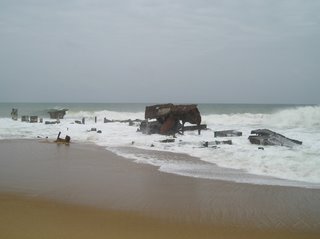I'm a empty-nester mom of 3 and wife to an oil-company executive who is working on a project in Lagos, Nigeria. All many people hear about Lagos is bad stuff -- I'm here looking for the good in Lagos.
Friday, October 20, 2006
The 22nd good thing about Lagos: Amazingly enough -- the happiest people live here!
http://news.bbc.co.uk/1/hi/world/africa/3157570.stm
There's plenty of other stuff on the web about this survey as well. But when people hear about all the violence and kidnappings and killings, etc. etc. that goes on in Nigeria, it's difficult to reconcile that with the world's happiest people. And when a spoiled and pampered American such as myself sees how most Nigerians live -- the desperate poverty and unhygenic and difficult living conditions, it's hard to believe that they could be happy with their lives. Here's more from that BBC article:
"Nigeria has the highest percentage of happy people followed by Mexico, Venezuela, El Salvador and Puerto Rico, while Russia, Armenia and Romania have the fewest. But factors that make people happy may vary from one country to the next with personal success and self-expression being seen as the most important in the US, while in Japan, fulfilling the expectations of family and society is valued more highly. The survey appears to confirm the old adage that money cannot buy happiness. The researchers for World Values Survey described the desire for material goods as "a happiness suppressant". They say happiness levels have remained virtually the same in industrialised countries since World War II, although incomes have risen considerably."
Another article (http://www.transnational.org/forum/power/2004/01.01_NigeriaHappiness.html)
quotes Nigerians saying why they are happy:
"Peter puts it down to God and music. "We have a great religious faith. Whether we are Christians like us or Muslims as in the north, we all believe ardently that God is looking after us. We believe in being our brother's keeper". Ele is perhaps more perceptive, "people smile at you because that is the way they deal with the awful stress in their poverty stricken life. I can take you to people in the village who are hungry, who are not happy, and God is just in their lives to give them solace. One reason why many of us are happy is that we don't ask for much. If God gives us food we easily become happy. We are not greedy. Gloria said, "You see it in how we move. It's a movement inside us and in society. We feel full of music and love of God. Her friend, the business woman, added, "We Nigerians look after each other. If I know you and you are hungry or ill I will try and help". The engineer said: "It was in our old tribal traditions and religion built on that. Have you ever seen such a religious people?"
It's definitely something to think about. Oh yes, where did the US fall in the happiness survey? 16th place.
Monday, October 02, 2006
The 21st good thing about Lagos: Having a church congregation where I can worship, where I feel needed and welcome and where there's great singing!
 My second Sunday in Lagos we went to church in our local church congregation (our ward service, as differentiated from our larger stake conference the week before . The Victoria Island ward of the Church of Jesus Christ of Latter-Day Saints meets in a large rented house. It serves the purpose, though it's definitely not as nice as the church-built building on the mainland. Most of the congregations in the Stake have a permanent building, but we don't have the necessary numbers in our ward. It looks nicer on the outside than it does on the inside. (The American women warned me to avoid using the bathroom at all costs!) But the meetings were very nice and much like what I'm accustomed to in the States. We had the women's meeting (Relief Society) first.
My second Sunday in Lagos we went to church in our local church congregation (our ward service, as differentiated from our larger stake conference the week before . The Victoria Island ward of the Church of Jesus Christ of Latter-Day Saints meets in a large rented house. It serves the purpose, though it's definitely not as nice as the church-built building on the mainland. Most of the congregations in the Stake have a permanent building, but we don't have the necessary numbers in our ward. It looks nicer on the outside than it does on the inside. (The American women warned me to avoid using the bathroom at all costs!) But the meetings were very nice and much like what I'm accustomed to in the States. We had the women's meeting (Relief Society) first.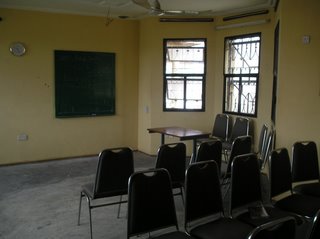
Here's a picture of the room, which is on the 2nd floor and pretty bare. But it was full of women with wonderfully colorful African clothes and big smiles and warm hearts. Though the room had bare cement floors and no other decoration -- they moved the table to the front and covered it with a bright blue tablecloth with the Relief Society motto stamped in gold on it -- "Charity never faileth." And on top was a blue vase with blue silk flowers. I was so moved by their efforts to beautify this spare room. Even in Nigeria, you can't get away from centerpieces in the RS classroom! The woman next to me shared her lesson manual and the teacher gave a great lesson and we had a nice discussion. I wanted to take a picture afterwards, but the women were gathered around me and introducing themselves and welcoming me. They were very sweet. I then went downstairs to the main chapel where we had Sunday School. The lesson was on Job, and it was very well-taught. As we were discussing the sufferings and trials of Job, I thought about what I guessed were the realities of the lives and trials of many of the members in that room. I know if many of us in our comfortable American lives were faced with what these Nigerians dealt with every day, we would consider ourselves as sorely tried as Job. We had been told that in the Stake, there is 60% unemployment among the members, but in our ward, there is 80% unemployment. And life is difficult for Nigerians even with jobs -- without work, I know that many of these people must live very desperate lives. But you wouldn't know it to look at them. I know it is a challenge for the expatriates who worship in Lagos, because they are sometimes approached and asked to help out families in situations of need. I'm sure they do provide help in many ways, but we are advised to remind them that the proper channel is to go to the bishop and ask for assistance and he will determine what is appropriate.
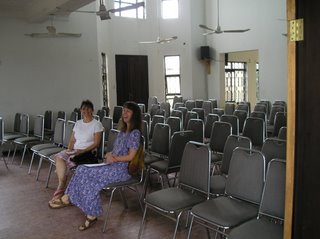 My new expatriate LDS friends brought me by the church building earlier in the week, and I got this picture of them in the chapel. On Sunday, the power was out and I guess the church either doesn't have a generator, or it was out as well, because the fans and microphone weren't working. It wasn't too bad sitting next to an open window with a breeze, but I imagine on a hotter day, it could be very difficult! The keyboard must have a backup battery, because it worked. They had heard that I played the piano, and asked me to play for the sacrament meeting service. They usually just have a missionary (a Nigerian) playing the keyboard, and Brent had told me that though he tried, he wasn't very experienced. The missionary very sweetly asked if he could sit by me while I played and watch how I moved my fingers so he could learn from me. I was glad to have his help with figuring out the techicalities of the keyboard, as well. I wish I could have had time to teach him a few lessons -- he was so eager to learn and was disappointed to hear that I was leaving that day. After I left, Brent said that he had been transferred and the ward now doesn't have anyone to play, so they sing without accompaniment. He said they ask every week when I will be back. I hope that when I'm there I'll be able to teach some piano lessons to some ward members so that eventually they'll have permanent people there to play for them. But the Nigerians LOVE to sing! (Even if their hymn books are almost falling apart, as you see in the picture here.)
My new expatriate LDS friends brought me by the church building earlier in the week, and I got this picture of them in the chapel. On Sunday, the power was out and I guess the church either doesn't have a generator, or it was out as well, because the fans and microphone weren't working. It wasn't too bad sitting next to an open window with a breeze, but I imagine on a hotter day, it could be very difficult! The keyboard must have a backup battery, because it worked. They had heard that I played the piano, and asked me to play for the sacrament meeting service. They usually just have a missionary (a Nigerian) playing the keyboard, and Brent had told me that though he tried, he wasn't very experienced. The missionary very sweetly asked if he could sit by me while I played and watch how I moved my fingers so he could learn from me. I was glad to have his help with figuring out the techicalities of the keyboard, as well. I wish I could have had time to teach him a few lessons -- he was so eager to learn and was disappointed to hear that I was leaving that day. After I left, Brent said that he had been transferred and the ward now doesn't have anyone to play, so they sing without accompaniment. He said they ask every week when I will be back. I hope that when I'm there I'll be able to teach some piano lessons to some ward members so that eventually they'll have permanent people there to play for them. But the Nigerians LOVE to sing! (Even if their hymn books are almost falling apart, as you see in the picture here.)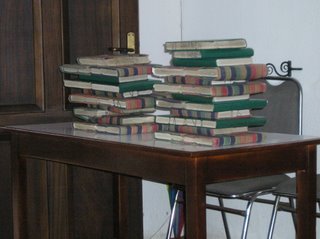 They sing out loud and strong and it's really exciting to be singing with them. We sang an intermediate hymn of "All Creatures of our God and King" and the ending was different than what they were used to -- the melody holds onto the note while the lower parts move and this confused some of them. So right after the meeting the bishop stood up and asked everyone to practice that hymn again because they had been singing it wrong and he wanted them to learn to do it right. I thought that was pretty neat. Also, during the meeting he sent me a note asking if I would bear my testimony in 2 minutes. This made me smile, because when we were over at our friend's house for dinner earlier in the week, they were discussing how in testimony meeting the bishop has a thing about not wanting people to speak for more than 2 minutes. He thinks if they talk longer they are taking someone else's time. He'll hold up a 2 minute warning sign, or nudge them to let them know they're going over their time limit. So I was careful to not talk too long. But the service itself was very good -- another missionary from Ghana was leaving to go home and he spoke his goodbye and told of his love for the people in the ward. There were probably a little over 100 people there in the meeting. Though the women were in brilliant African clothes, all the men in the room (except my husband, who wore a blue shirt that day) were dressed in Western dress with white shirts. One of the Americans had previously asked the bishop why the men never wear African dress to church and he had responded that they had been told that a white shirt is the appropriate dress for a priesthood holder and if they wanted to participate in the priesthood ordinances, they should wear a white shirt. I have mixed feelings about this. I know white shirts symbolize purity before God and I think it's a powerful symbol, though I do believe God cares much more about what's in our hearts than what we wear. But I was very touched by how all the men in the ward choose to obey their leader and honor their priesthood. I came away from worshipping with these Nigerian saints with the strong impression that though I certainly would be welcome and could contribute with things like my musical ability, I would also love the opportunity to learn from these humble and faithful people.
They sing out loud and strong and it's really exciting to be singing with them. We sang an intermediate hymn of "All Creatures of our God and King" and the ending was different than what they were used to -- the melody holds onto the note while the lower parts move and this confused some of them. So right after the meeting the bishop stood up and asked everyone to practice that hymn again because they had been singing it wrong and he wanted them to learn to do it right. I thought that was pretty neat. Also, during the meeting he sent me a note asking if I would bear my testimony in 2 minutes. This made me smile, because when we were over at our friend's house for dinner earlier in the week, they were discussing how in testimony meeting the bishop has a thing about not wanting people to speak for more than 2 minutes. He thinks if they talk longer they are taking someone else's time. He'll hold up a 2 minute warning sign, or nudge them to let them know they're going over their time limit. So I was careful to not talk too long. But the service itself was very good -- another missionary from Ghana was leaving to go home and he spoke his goodbye and told of his love for the people in the ward. There were probably a little over 100 people there in the meeting. Though the women were in brilliant African clothes, all the men in the room (except my husband, who wore a blue shirt that day) were dressed in Western dress with white shirts. One of the Americans had previously asked the bishop why the men never wear African dress to church and he had responded that they had been told that a white shirt is the appropriate dress for a priesthood holder and if they wanted to participate in the priesthood ordinances, they should wear a white shirt. I have mixed feelings about this. I know white shirts symbolize purity before God and I think it's a powerful symbol, though I do believe God cares much more about what's in our hearts than what we wear. But I was very touched by how all the men in the ward choose to obey their leader and honor their priesthood. I came away from worshipping with these Nigerian saints with the strong impression that though I certainly would be welcome and could contribute with things like my musical ability, I would also love the opportunity to learn from these humble and faithful people.
Friday, September 22, 2006
The 20th good thing about Lagos: Having a driver!
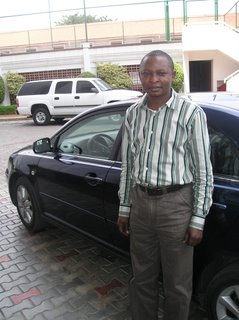 pretty workable plan for vehicles. They have a fleet of cars and hire the drivers. Each expatriate will have a driver that is assigned to them, but on their days off, they will provide you with someone else to drive you around. Each family will have the use of one car and driver at no cost to the expatriate. If we were to need a second vehicle (which I don't think we will), the company would deduct an "auto cost factor" from our paycheck. They basically figure an average cost for a vehicle and gas and take that from you. But it's a pretty nice perk, I think to have a car and driver and gas at no cost. They provide that because, frankly, at times it is an inconvenience to have to plan ahead to have the driver there when you need him and not always have the car instantly at your disposal. And when you need your driver at night, you realize that you're keeping him from going home to his family, so that kind of made me feel bad for him. Dennis looks like a really young guy, but actually he has a 19 year old son -- he said he became a father when he was just a teenager and his parents pretty much raised his son. He's now married with, I think, 3 young children. He came to Lagos many years ago and wanted to go to college to be an engineer, but he didn't have enough money, so he got a job as a driver. He still tries to take some classes in his spare time in hopes to get a better job. But he says that driving is a pretty good job. The drivers have security training and they are our protection, though driving around the islands, they are not generally armed. They all have cell phones, as well as a radio in the car and every 15 minutes or so, they call in their position to the radio room. The radio room monitors any areas of disturbance in the city and will let the drivers know of areas to avoid. Several years ago on Victoria Island (which is considered a safer part of Lagos) there was a carjacking of a ConocoPhillips car -- the expatriate was released unharmed, but the driver was killed. In a dinner discussion, an expatriate said that was often the case with crime here, the expatriate's money or possessions will be taken, but they will usually be unharmed. Nigerian lives don't get the same respect. That's maybe a bit reassuring for me -- but I certainly hope that I am never in a position where someone else becomes a victim in an attempt to protect me.
pretty workable plan for vehicles. They have a fleet of cars and hire the drivers. Each expatriate will have a driver that is assigned to them, but on their days off, they will provide you with someone else to drive you around. Each family will have the use of one car and driver at no cost to the expatriate. If we were to need a second vehicle (which I don't think we will), the company would deduct an "auto cost factor" from our paycheck. They basically figure an average cost for a vehicle and gas and take that from you. But it's a pretty nice perk, I think to have a car and driver and gas at no cost. They provide that because, frankly, at times it is an inconvenience to have to plan ahead to have the driver there when you need him and not always have the car instantly at your disposal. And when you need your driver at night, you realize that you're keeping him from going home to his family, so that kind of made me feel bad for him. Dennis looks like a really young guy, but actually he has a 19 year old son -- he said he became a father when he was just a teenager and his parents pretty much raised his son. He's now married with, I think, 3 young children. He came to Lagos many years ago and wanted to go to college to be an engineer, but he didn't have enough money, so he got a job as a driver. He still tries to take some classes in his spare time in hopes to get a better job. But he says that driving is a pretty good job. The drivers have security training and they are our protection, though driving around the islands, they are not generally armed. They all have cell phones, as well as a radio in the car and every 15 minutes or so, they call in their position to the radio room. The radio room monitors any areas of disturbance in the city and will let the drivers know of areas to avoid. Several years ago on Victoria Island (which is considered a safer part of Lagos) there was a carjacking of a ConocoPhillips car -- the expatriate was released unharmed, but the driver was killed. In a dinner discussion, an expatriate said that was often the case with crime here, the expatriate's money or possessions will be taken, but they will usually be unharmed. Nigerian lives don't get the same respect. That's maybe a bit reassuring for me -- but I certainly hope that I am never in a position where someone else becomes a victim in an attempt to protect me.
Thursday, September 21, 2006
The 19th good thing about Lagos: Going through the jungle to see a shipwreck!

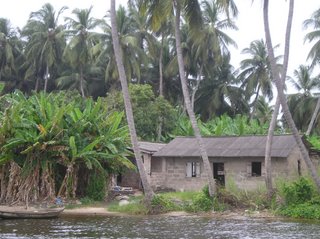
It was amazing the difference in the plant growth just this short distance away. By the beach hut there was just coconut palms and sand. Here, it was jungle. Our hosts said when they had been there before they saw monkeys in the trees, though we didn't when we were there. A snake did cross the path, and we saw lots of chickens running around the villages, but that was it as far as wildlife goes.
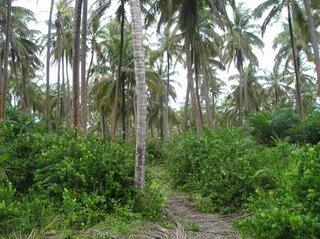 Here the peninsula was wider between the creek and the ocean beach and we hiked along a path passing several primitive villages with palm huts.
Here the peninsula was wider between the creek and the ocean beach and we hiked along a path passing several primitive villages with palm huts.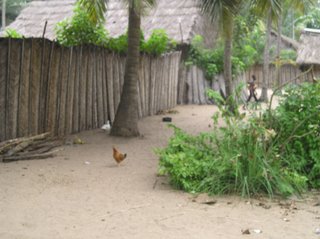
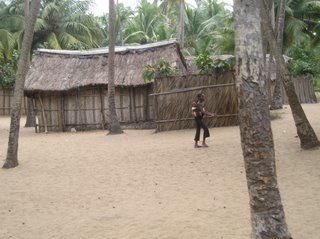 They all had piles of coconut shells beside the huts. I don't know if they were just garbage piles, or if they kept the shells for fuel.
They all had piles of coconut shells beside the huts. I don't know if they were just garbage piles, or if they kept the shells for fuel.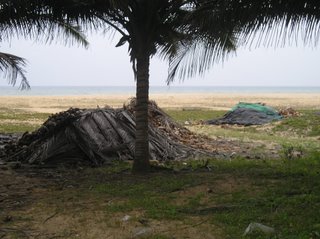
There wasn't much left of the ship. I think they said it had just ran aground in 1998, and the villagers thought the ship, with its load of furniture and goods, was a gift from the gods. They cleaned it out pretty quickly. But the hull and parts which were left there have really altered the beach and the sands of the whole peninsula as the tides were changed to go around the wreck. Now there has been a lot more sand deposited there and the village is much further from the water than it was before. I thought it was interesting how in just 7-8 years there could be such a big change in the whole land area of the peninsula.

Here's a picture of Brent giving some "dash" to the women in the village for allowing us to walk through their land and take their picture. Then, several of the villagers came down to the creek to help us push off.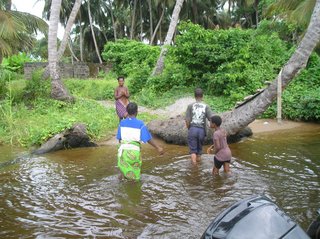
It was quite amazing to have a real African jungle adventure!
Monday, September 04, 2006
The 18th good thing about Lagos: Seeing cute kids in remote areas who have funny names for white people.
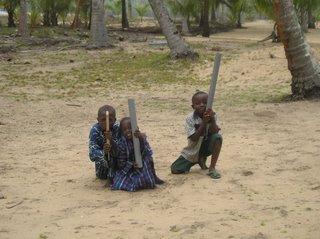

They were playing with sticks that were laying around and were very happy that our friends had brought some old soccer balls for them to play with. They enjoyed posing for pictures and loved looking at their picture on the back of the camera. They would find themselves in the picture and point and just laugh. They seemed to understand some English, but they didn't speak it well.
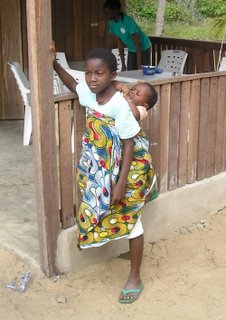
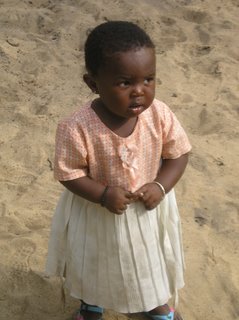 Here are some other pictures of people that were around from the village that owns the land the beach huts are built on. I guess the huts are their revenue source -- along with the "dash" that I passed on to them for taking their picture. I didn't have small bills for all the kids, so I had a little grabbing fight break out among them for the bill I offered them. Isn't this little girl cute! On the left, possibly it's her big sister carrying her, posing by the guard hut. All over the place you see babies being carried on backs with these wrapped ties. They always seem pretty happy to be there.
Here are some other pictures of people that were around from the village that owns the land the beach huts are built on. I guess the huts are their revenue source -- along with the "dash" that I passed on to them for taking their picture. I didn't have small bills for all the kids, so I had a little grabbing fight break out among them for the bill I offered them. Isn't this little girl cute! On the left, possibly it's her big sister carrying her, posing by the guard hut. All over the place you see babies being carried on backs with these wrapped ties. They always seem pretty happy to be there. 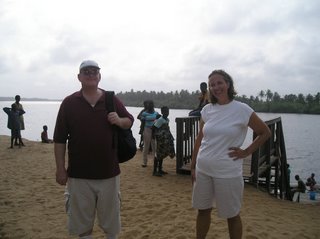 When we left, there were lots of villagers who showed up, hoping to help us load up and see us off and, probably, hoping for a little "dash" in the process.
When we left, there were lots of villagers who showed up, hoping to help us load up and see us off and, probably, hoping for a little "dash" in the process.
Thursday, August 31, 2006
The 17th good thing about Lagos: Fun escapes to the beach
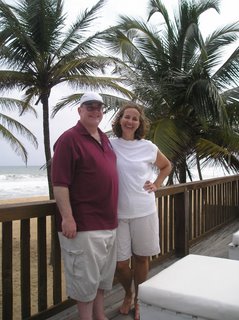 I never gave a report on our last fun Saturday in Lagos. The ConocoPhillips managing director and his family had just returned from summer vacation in the States on Friday and they were very kind to invite us to go with them to the company beach hut for an outing on Saturday. They said they try to make a point to take visitors there to show them that there is a place to go to escape the filth and crowds of Lagos and get a little bit of escape. We really enjoyed getting to know them and had a great day. It certainly is the way to have an outing at the beach -- there's guys around to load the gear in the car and then to take it from the car to the boat and to have the boat ready and drive you there and then tote it from the dock to the beach hut and to watch over the kids while they play and swim while you relax and play bocce and they cook your dinner and clean up and load the stuff back in the boat when you're ready to leave, and clean up the boat when you return, etc. It's a much more relaxing outing than it would be here in the States.
I never gave a report on our last fun Saturday in Lagos. The ConocoPhillips managing director and his family had just returned from summer vacation in the States on Friday and they were very kind to invite us to go with them to the company beach hut for an outing on Saturday. They said they try to make a point to take visitors there to show them that there is a place to go to escape the filth and crowds of Lagos and get a little bit of escape. We really enjoyed getting to know them and had a great day. It certainly is the way to have an outing at the beach -- there's guys around to load the gear in the car and then to take it from the car to the boat and to have the boat ready and drive you there and then tote it from the dock to the beach hut and to watch over the kids while they play and swim while you relax and play bocce and they cook your dinner and clean up and load the stuff back in the boat when you're ready to leave, and clean up the boat when you return, etc. It's a much more relaxing outing than it would be here in the States. 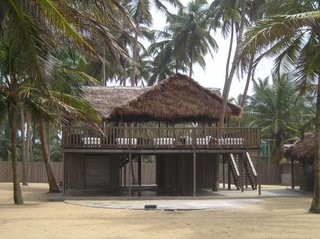 (Not to mention that the guys are toting an AK-47 so you can relax and forget that there may be dangers around you.) You can see the beach hut is really very nice. And the Atlantic Ocean beach was beautiful!
(Not to mention that the guys are toting an AK-47 so you can relax and forget that there may be dangers around you.) You can see the beach hut is really very nice. And the Atlantic Ocean beach was beautiful! 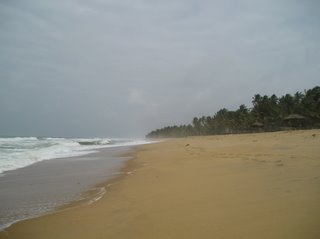
To get there, it's about a 45 minute speedboat ride up the "creek" from Lagos -- it's really quite a wide river which, thankfully, is upstream from the filth of the city. You see views like the pictures below with people doing business and fishing on the river and
 ferrying across.
ferrying across.
The boat dock was on the creek, and we walked across the sandy peninsula (maybe 200 yards) to the beach house, which faces the Atlantic beach. There's coconut palms and one of the guards shimmied up one to cut us down a fresh coconut. Todd and the girls went waterskiing, but I chose not to on this trip, as it was kind of overcast and actually chilly. Wading was as wet as I got. We had a fun expedition to a shipwreck site, which I'll put in another post. All in all, it was a great day. They let me drive the boat on the trip back and I was proclaiming "I AM DRIVING A BOAT IN AFRICA!" It's really amazing the turns that life takes that I never would have dreamed I would experience!
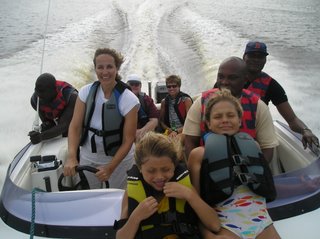
Thursday, August 24, 2006
The 16th good thing about Lagos: The opportunity to leave the US and return and realize how good and easy life is here.
Anyway, we were very relieved when arriving home and finding all was well. I only had time for a quick shower before going to a Symphony chorus rehearsal -- so it was right back into activity. But the biggest first impression of being home is one of comfort and ease. The ability to brush one's teeth without using bottled water. To go to the grocery store and have such a plentiful and relatively inexpensive bounty of items to choose from. To make a salad or eat some fruit without soaking the produce in bleach for 20 minutes. To get in the car and drive where I want when I want without real security worries (well -- at times having a driver would be a real plus in Houston traffic!) and to have traffic laws that you generally expect will be followed. To be able to walk around my neighborhood freely on streets that are not lined with trash and beggars and people who have set up their home underneath a cloth held up with sticks because there is no other place for them to live. The poorest people here have it so much better than so many millions of Nigerians because here there is the opportunity to find assistance should someone pursue it and here there are possibilities that the poorest Nigerians can't even imagine. There are some really great things about life in the USA.
We had some fun experiences in our final days in Lagos that I haven't written up yet -- so there's still some "good things in Lagos" yet to be recorded. Stay tuned!
Saturday, August 19, 2006
The 15th good thing about Lagos: Stewards and Stewardesses
Below is a photo of Angela, a stewardess. I only got to know her for a few days before we left. She was in training to relieve the regular steward of our flat: Andy. Andy spent several days teaching her the ropes. Andy's not wearing his usual neat apron here because he's just about to leave on his month-long vacation. Angela is now ready to take over. Andy does some laundry, but we're careful about what we allow him to wash, as we've been warned he has ruined some clothes. He does dishes, cleans everything and is a meticulous ironer. He's also very pleasant to be around -- he's happy all the time and sings as he works. I've also noticed that Angela also hums as she cleans. Andy takes care of two flats because often there
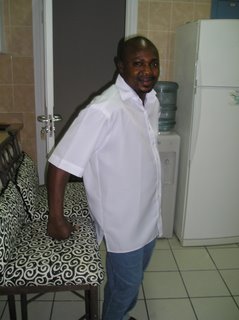 aren't many, or even any,
aren't many, or even any, 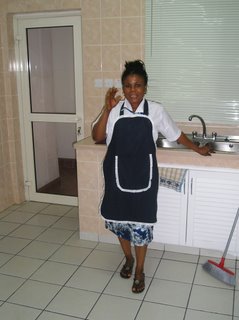 people in them, as they are flats the company keeps for temporary people. While we're living here, the company pays for our househelp. They are contracted and paid by them, so that's a great perk to offset the difficulties of living in a 3rd world country. When we were over at friends for dinner, their steward, who is also a great cook, fixed a fabulous dinner. He's from the Republic of Benin where he learned to cook French, and he's great with presentation and loves cooking a beautiful meal. He even set the table with a fancy folded napkin at each setting. And then he cleaned up while we visited after dinner. I could get used to having a steward or a stewardess around the house!
people in them, as they are flats the company keeps for temporary people. While we're living here, the company pays for our househelp. They are contracted and paid by them, so that's a great perk to offset the difficulties of living in a 3rd world country. When we were over at friends for dinner, their steward, who is also a great cook, fixed a fabulous dinner. He's from the Republic of Benin where he learned to cook French, and he's great with presentation and loves cooking a beautiful meal. He even set the table with a fancy folded napkin at each setting. And then he cleaned up while we visited after dinner. I could get used to having a steward or a stewardess around the house!
Friday, August 18, 2006
The 14th good thing about Lagos: Everyone speaks English (sort of)
Thursday, August 17, 2006
The 13th good thing about Lagos: You can get some help and make a boy's day for only 100 naira (about 70 cents).
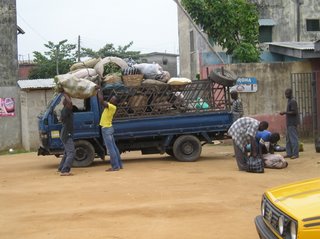
I wish I had gotten a photo of Philip, who was our helper on my first visit to the market with Brent. We decided we would choose the smallest boy and we got Philip, who seemed to be a very smart kid. He brought us to some stalls where I could get a delicious pineapple and some vegetables and he advised me about prices. He led us through the maze of shops and showed us where to look for different items. He asked us to request him next time we came -- he said if we didn't see him to tell the boys we want Philip and they will find him. But he warned us that he is only at the market on weekends. He proudly said that he went to school during the week. Brent said "that's a very good place to be -- you need to stay in school." Brent asked Philip what he wanted to be when he grew up, and Philip said he wanted to be an accountant. Brent assured him that being an accountant is a good job to have and he should stay in school so he could do that. At the end of a visit to Lekki market, when all your purchases are in your car, you give your boy-helper 100 naira, and they walk away, pleased to have been the one chosen to help you.
The 12th good thing about Lagos: Varied shopping available from your car window on the Falomo bridge
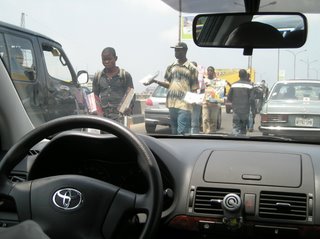
Things for sale today on the Falomo bridge:
1. car mats
2. knives
3. cellular phone cards to recharge your phone account -- these are for sale on every street in the city
4. books --one textbook on electrical engineering I've seen several times, also Covey's "Seven Habits of Highly Effective People" and "Who Moved My Cheese" -- many religious books like illustrated Bibles as well as children's books
5. pants
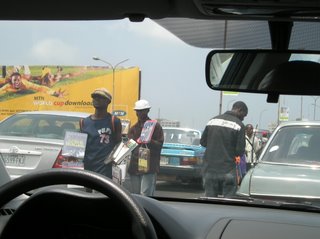
6. some interesting fake-bronze (maybe plastic?) sculptures -- the ones I looked at were of a golfer and a tennis player
7. sets of kitchen tools
8. individually wrapped cakes that look like Twinkies
9. bottles of soda and water
10. pens
11. CD rack
12. CDs and DVDs
13. bananas
14. picture frames
15. candy and gum
16. Wahl hair clipper sets
17. cleaning brushes of many varieties
18. a cutlery set with wicker holder
19. peanuts
20. Nigerian mens clothing
21. bags of potatoes
22. drink boxes
23. watches
24. suitcases
25. paintings -- on canvas and "special" ones on velvet
26. lighters
27. magazines -- including Vogue and Reader's Digest
28. tape measures
29. a hand riveter
30. wallets
31. cell phones
32. light bulbs
33. plantain chips
34. hats
35. toys
36. newspapers
37. rugby shirts
38. sunglasses
39. eye glasses
40. belts
41. clocks
42. tomatoes
43. potato chips
And in addition to the vendors, we have the beggars come to our windows with pleading eyes -- mothers carrying two small babies, one in front and one in back. Little children leading their blind fathers, people with missing limbs, today a little girl who walked along with us repeating "Master, please help me, master." We are advised to not give to the street beggars -- some of them are scam artists, borrowing children or the handicapped to prey on the sympathies of the public, and many of them are actually placed there by pimps who get most of their profits. But it is very difficult to turn my head and turn off my sympathies. I hope that while I'm here I won't lose my feelings of compassion -- I just know I'll have to find other ways to give.
As for the shopping, our driver says that for security reasons, as well as other reasons, we really can't buy anything from the vendors along the street. What lost opportunities! I'm still mulling over the value of that toilet seat I could have bought from the car last week -- you don't see those for sale every day!
Wednesday, August 16, 2006
The 11th good thing about Lagos: Generators
Tuesday, August 15, 2006
The 10th good thing about Lagos: Malarone
"It is the small creatures that cripple and kill in Africa. The storybooks lie. Lions and leopards are insignificant. Viruses, amoebas, insects, worms, bullets, these are the predators of Africa...Sleeping sickness, trypanosomiasis, is transmitted by the tsetse fly. Typhus is transmitted by ticks. Malaria, the ancient mass murderer of Africa that deftly kills a million people a year, is transmitted by the mosquito. So is yellow fever. AIDS is a mere virus that is annihilating entire countries. Still, you don't hear that much about any of them. They are too common. Many Africans have one or another of these infirmities and they live with them, don't whine, and die quietly. Insalubrity is a natural state. An undiseased body, without wounds or worms or parasites, is what is unnatural. What you hear about, of course, are the attacks by the larger assassins, lions or leopards[or, I might add, humans]. They aren't any more courageous -- they also take the young, the weak, or the ill. But because their ferocity is so rare and so dramatic, it makes for better stories. Even the Africans think so."Malaria is a parasite carried in the saliva of female mosquitoes. (Beware the bite of a female! Of course, since I have no idea how to determine the gender of each individual mosquito, I've decided to attempt to avoid the bites of ALL mosquitoes!) Nigeria is a country with a malaria risk. Within the city of Lagos, of course, there is less risk than in other, more rural and jungleified, parts of the country. But the risk is still such that we expatriates are required to take malaria prophylaxis, which the company pays for. There are several drugs available, none of which will totally eliminate your chances of contracting malaria, but they can greatly reduce your chances of getting it and, if you do contract it, you will probably have a milder bout. Before I left, it was recommended that I take Malarone, which is a pill that is a combination of two drugs. I have to take one pill a day, which I started two days before arriving in Nigeria and I'll continue taking it 7 days after I leave. I haven't noticed any side effects. There is another drug, Larium, that some people take because it's cheaper and it only requires one pill weekly. A common side effect with this drug is more frequent dreams that are extremely vivid. I'm thinking that if the dreams were fun ones, that might be a drug I want to test out sometime!
Monday, August 14, 2006
The 9th good thing about Lagos: New friends to show me around and give me advice
Sunday, August 13, 2006
The 8th good thing about Lagos: Worshipping with the Saints


Here's some pictures after the meeting in the courtyard. Below is a shot of some missionaries handing out pamphlets an
 d books.
d books.Saturday, August 12, 2006
The 7th good thing about Lagos: No coins to weigh you down!

The 6th good thing about Lagos: Watching everything Nigerians can carry on their heads!
We were crawling along the beach road in traffic when I saw these woman approaching and I asked my driver if he thought they would mind if I took their picture. He said "No, they will probably like it." He was right -- after they saw me take their picture, they collapsed in laughter, but they didn't drop their loads! The tray in back covered with plastic wrap is loaves of bread. They sell these on just about every corner. The rocks in the background are for a beach conservation project. The water from the Atlantic often rises up and covers the road, leaving lots of sand behind. The rocks are for a project to keep the beach and the road separate.
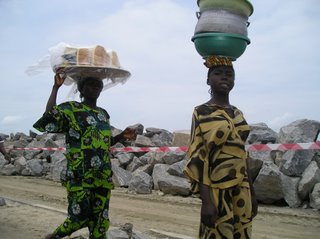
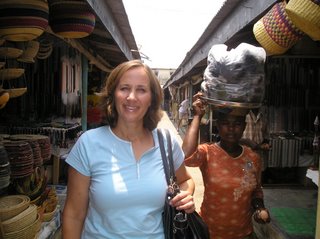 I'm not sure what this woman was carrying on her head. We were shopping at Lekki market today -- lots of neat handicrafts and interesting things to see.
I'm not sure what this woman was carrying on her head. We were shopping at Lekki market today -- lots of neat handicrafts and interesting things to see.Here's another shot from Lekki market. She has peanuts in the tray on her head.
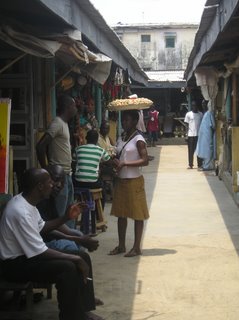
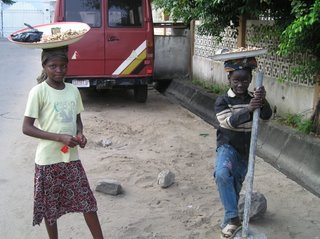
We passed these children on the street by our apartment as we walked to the movie theater. They asked if we wanted to buy some peanuts. I asked if I could take their picture. The boy ran away at first but a man who I assume was their father told him to go get in the picture. The girl smiled when I showed her the picture on the camera and I gave her a small naira "dash" (a tip or extra payment) to thank them.
Maybe while we're here, I'll practice carrying things on my head to see how far I can go before I spill the load of peanuts!
The 5th good thing about Lagos: Going to the movies!
Friday, August 11, 2006
The 4th good thing about Lagos: You're welcome!
Thursday, August 10, 2006
The 3rd good thing about Lagos: Nice views from the apartment!
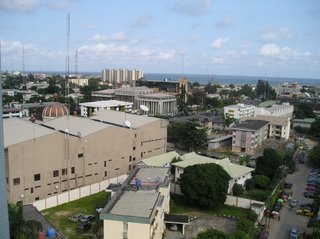
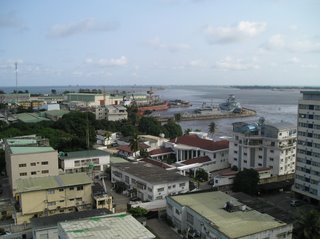
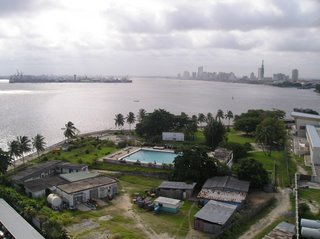
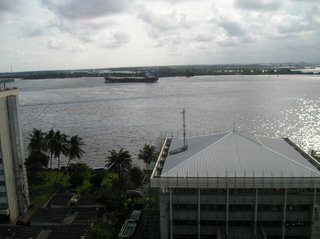
Here's a picture of our swimming pool area. Just on the other side of the fence is a row of open tin shacks where people live. I see them in the morning carrying jerry cans of water. Quite a sobering contrast in lifestyles!
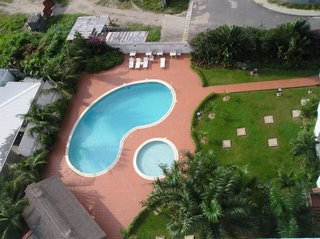

Of course, these are some of the prettier views of Lagos -- someday I'll post some of the not-so-pretty views. There are plenty of those as you drive the streets!
The 2nd good thing about Lagos: High security (at least I feel better when I believe I'm secure)!
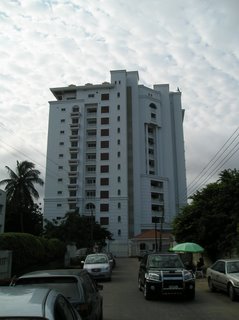
This is our apartment building: Atlantic Royal Gardens (ARG). It has great security: there's a gate that screens people and cars coming in, there's someone at the desk in the lobby and each apartment (2 on each floor) has a heavy locking gate in front of the entry, as well as a deadbolt on the door.
There are usually 4 security personnel at the gate. When I asked if I could take their picture, one guy stepped out of the picture, one is in the room, and these two turned their heads. But they are usually friendly guys who always wave when I come in or out. Right outside the gate are lots of okadas -- motorcycle taxis -- waiting for customers from the office building next door. This building also houses many of the American consulate personnel -- so I think the security must be pretty good if they are living here!
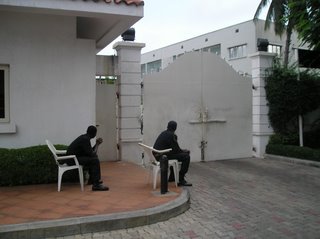

So, mom and kids, hopefully you feel a little better about my safety and security!
